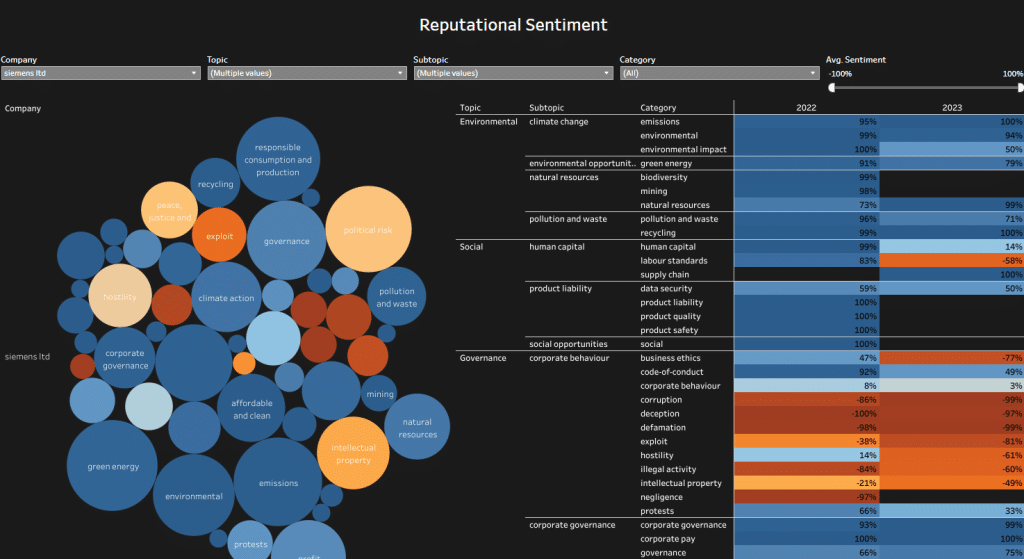Siemens, a global leader in technology and engineering, has long been committed to sustainability and environmental stewardship. The company’s Environmental, Social, and Governance (ESG) Score is a comprehensive measure of its sustainability efforts. In this article, we will delve into the significance of Siemens sustainability journey, the company’s ESG score.
Understanding ESG and its importance
ESG refers to the three main factors that measure the sustainability and ethical impact of a company’s operations. Environmental criteria assess a company’s impact on the environment, such as carbon emissions and resource consumption. Social criteria evaluate a company’s relationships with employees, customers, and communities, focusing on factors like labor practices and community engagement. Governance criteria examine a company’s internal policies, including board diversity and executive compensation.
The importance of ESG has grown significantly in recent years as investors and consumers increasingly prioritize companies that demonstrate strong sustainability practices. ESG factors are seen as indicators of long-term financial performance and risk management. By considering ESG criteria, companies like Siemens can enhance their reputation, attract investors, and contribute to a sustainable future.
Overview of Siemens ESG Score and its significance
Siemens’ ESG Score is a comprehensive assessment of the company’s sustainability efforts across various dimensions. It provides a clear snapshot of Siemens’ performance in environmental, social, and governance areas, allowing stakeholders to evaluate its impact on society and the planet.
The Siemens ESG Score of 97 for environmental, 90 for social and 71 for governance factors reflects the company’s commitment to environmental stewardship, social responsibility, and ethical practices. By actively managing its ESG risks and opportunities, Siemens aims to create long-term value for its shareholders while minimizing its environmental footprint and positively impacting communities.

Key components of Siemens sustainability efforts
Environmental initiatives by Siemens
Siemens recognizes the urgent need to address climate change and reduce its environmental impact. As part of its sustainability efforts, the company has set ambitious targets to become carbon neutral by 2030. Siemens aims to achieve this by increasing energy efficiency, transitioning to renewable energy sources, and developing innovative technologies that enable sustainable practices.
One of Siemens’ notable environmental initiatives is its commitment to promoting the circular economy. The company focuses on designing products that are resource-efficient, easily recyclable, and have minimal environmental impact throughout their lifecycle. Siemens also invests in research and development to create sustainable solutions for industries such as energy, transportation, and manufacturing.
Social responsibility initiatives by Siemens
Siemens places a strong emphasis on social responsibility, aiming to create a positive impact on communities and society as a whole. The company actively engages in corporate social responsibility initiatives, including educational programs, community development projects, and philanthropy.
Siemens invests in education and skills development to empower individuals and improve employability. The company collaborates with educational institutions to promote STEM education, fostering innovation and preparing future generations for the challenges of a rapidly evolving world.
Furthermore, Siemens is committed to diversity and inclusion within its workforce. The company aims to create a working environment that embraces individuals from diverse backgrounds and fosters equal opportunities for all. By prioritizing social responsibility, Siemens demonstrates its commitment to making a positive difference in society.
Governance and ethical practices at Siemens
Good governance and ethical practices are fundamental to Siemens’ sustainability efforts. The company operates with integrity, transparency, and accountability, ensuring that its decision-making processes align with its values and the expectations of its stakeholders.
Siemens maintains a robust governance framework that includes clear policies, procedures, and internal controls. The company’s board of directors oversees the implementation of these practices, ensuring compliance with legal and regulatory requirements.
Siemens also prioritizes risk management and business ethics. The company has established mechanisms to identify and mitigate risks related to corruption, bribery, and other unethical practices. By upholding high standards of governance and ethics, Siemens builds trust with its stakeholders and maintains its reputation as a responsible corporate citizen.


Impact of Siemens sustainability efforts on the business and stakeholders
Siemens’ sustainability efforts have a positive impact on both the business and its stakeholders. By integrating sustainability into its core business strategy, Siemens strengthens its competitive advantage, attracts top talent, and fosters innovation. The company’s commitment to sustainability resonates with customers and investors who prioritize ethical and environmentally conscious practices.
Siemens’ sustainability initiatives also contribute to the well-being of its stakeholders. By reducing its environmental footprint, the company helps mitigate climate change and protect ecosystems. Through its social responsibility initiatives, Siemens supports education, skills development, and community empowerment, positively impacting individuals and communities worldwide.
Furthermore, Siemens’ strong governance practices enhance trust and confidence among stakeholders. By operating with integrity and transparency, the company ensures that its actions align with the expectations of shareholders, employees, customers, and the wider society.
Challenges and future goals for Siemens sustainability
While Siemens has made substantial progress in its sustainability efforts, there are challenges and opportunities that lie ahead. As a technology company operating in a rapidly evolving landscape, Siemens must continually adapt and innovate to address emerging environmental and social issues.
One of the key challenges for Siemens is to further reduce its carbon footprint and transition to renewable energy sources. The company aims to achieve this through energy-efficient solutions and renewable energy projects. Siemens also faces the challenge of promoting sustainable practices across its supply chain, collaborating with suppliers to improve their environmental and social performance.
In terms of social responsibility, Siemens seeks to deepen its impact by expanding educational programs and community development initiatives. The company aims to empower individuals and communities, particularly in underserved areas, to foster inclusive growth and social progress.
Siemens sustainability and ESG score peer comparison
Siemens is generally considered to be a leader in sustainability among its peers in the industrial sector. consistently outperformed its competitors in terms of ESG ratings. This is likely due to its strong commitment to sustainability, which is reflected in its DEGREE framework. The DEGREE framework is a comprehensive approach to sustainability that encompasses six key areas: decarbonization, ethics, governance, resource efficiency, equity, and employability. Explore our ESG scores for Siemen’s competitors below:
- General Electric ESG score
- ABB Group ESG score
- Schneider Electric ESG score
- Honeywell International ESG score
- Mitsubishi Electric Corporation ESG score
- Emerson Electric Co ESG score
- Rockwell Automation ESG score
Conclusion: The role of Siemens ESG Score in shaping a sustainable future
Siemens’ ESG Score serves as a powerful tool to measure and communicate the company’s sustainability efforts. It showcases Siemens’ commitment to environmental stewardship, social responsibility, and good governance. By integrating sustainability into its core business strategy, Siemens contributes to a more sustainable future.
The importance of ESG factors cannot be overstated. As investors and consumers increasingly prioritize sustainability, companies like Siemens have a crucial role to play in driving positive change. By embracing ESG principles, companies can enhance their performance, attract capital, and contribute to the well-being of society and the planet.
Siemens’ sustainability efforts demonstrate that economic success and environmental and social responsibility can go hand in hand. Through its environmental initiatives, social responsibility programs, and strong governance practices, Siemens sets a benchmark for sustainable business practices. By striving for continuous improvement and innovation, Siemens paves the way for a more sustainable and prosperous future.
Find out more
Ready to delve deeper into Siemens’ sustainability initiatives and ESG performance? Fill in the form below to access more granular data on key components, environmental initiatives, social responsibility efforts, and governance practices. Gain valuable insights into the impact of Siemens’ sustainability on business and stakeholders, its challenges, and future goals. Additionally, explore a peer comparison of Siemens’ ESG score against industry competitors.
